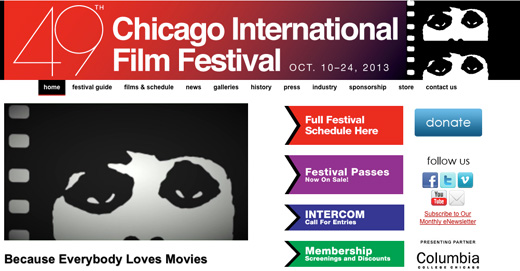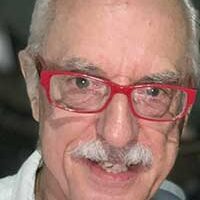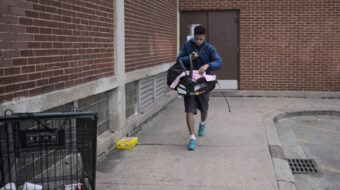
Heading into its 49th season, the Chicago International Film Festival is the longest-running competitive film festival in North America. With over 150 titles from over 50 countries, there is a wealth of films to choose from for any progressive viewer.
Last year’s festival presented many provocative films including As Goes Janesville, one of the many great films chronicling the assault on working people in Wisconsin, in the league with We Are Wisconsin, Citizen Koch and Michael Moore’s powerful filmed speech, America is NOT Broke.
One of the most creative films shown last year reveals the relationship between art and social activism: Art of Conflict shows the many political murals in Northern Ireland depicting the struggle for independence. Fascinating interviews with the muralists and activists from both sides creates amazing dialectics that give life to the murals as they change daily during the struggle.
Ken Burns’ Central Park Five had its U.S. premiere in Chicago and has gone on to be one of the top documentaries touring the festival circuit. It reveals the injustice suffered by the young men who were unjustly arrested for the tragic 1989 jogger rape case, and who spent many years in prison.
Anand Patwardhan’s Jai Bhim Comrade is a lengthy in-depth study of the Indian caste system and the injustice endured for centuries by the Dalits, or “Untouchables.” Priceless footage of people rarely filmed, let alone considered, is carefully selected by the progressive director Patwardhan who challenges the masters of Indian cinema with his own probing 14-year project.
A provocative reenactment of the 2001 G8 Summit protests in Genoa that resulted in a bloody response from the police, Diaz Don’t Clean Up This Blood depicts the violence of the state apparatus so accurately that the film couldn’t get funding in Italy, and had to be shot in neighboring Romania. It’s a remarkable artistic achievement that is an absolute must-see for activists.
A comedy from Iran at first would appear oxymoronic, but Adel Yaraghi’s Meeting Leila provides yet another example of the deeply humanistic cinema that pours from filmmakers in that threatened country. An advertising agent needs to quit smoking in order to marry the woman he loves, who is played by the great Iranian actress Leila Hatami. But smoking is part of his creative process and the challenge provides many humorous and poignant episodes in this totally charming battle of the spouses. In the process, the viewer is treated to the realities of life in a country Westerners know little about, and yet another fine reason to attend great Film Festivals in order to see rare and important films that would otherwise be difficult to view.
This year’s Chicago International Film Festival will run Oct 10-24 and once again will offer the chance to see the world seldom seen elsewhere. Several of the best films from Toronto will also be shown in Chicago. Steve McQueen’s 12 Years a Slave, winner of Toronto’s Audience Award and reviewed here previously, offers a fresh and chilling view of American slavery. Mandela: Long Walk to Freedom sold out every screening in Toronto. British actor Idris Elba (Stringer in The Wire) plays the revolutionary icon in an award-winning performance. Philomena stars Judi Dench in a wrenching performance as an unwed mother in search of the child she was forced to give up for adoption in Catholic Ireland. It’s directed by master filmmaker Stephen Frears, who’s given us over 50 great films in his career, including Dangerous Liaisons, Dirty Pretty Things, The Queen and My Beautiful Launderette.
Several highly revered documentarists have their latest films premiering in Toronto and now in Chicago.
Famed documentary-maker Errol Morris provided us with an in-depth view of a former U.S. secretary of defense in The Fog of War: Eleven Lessons from the Life of Robert S. McNamara (see this commentary). Now Morris felt compelled to cover the other major defense secretary in his life, Donald Rumsfeld. The Unknown Known focuses on Rumsfeld, and for most of our readers who’ve had enough of him, here’s a chance to rejoice in seeing Morris quickly reveal Rumsfeld’s shallowness and vanity. Morris will also be at the Chicago festival to be honored for his creative filmmaking, which includes such classics as Brief History of Time, Fast, Cheap & Out of Control, Standard Operating Procedure and The Thin Blue Line.
French documentarian Claude Lanzmann, famous for his 1975 Holocaust epic Shoah, revisits one of the interviewees from that film in The Last of the Unjust, Viennese rabbi Benjamin Murmelstein, who worked with Nazi Adolf Eichmann to help emigrate 120,000 Jews from war-ravaged Germany.
The other legendary American documentarist represented here, Frederick Wiseman (Hospital, Titicut Follies, Public Housing, Welfare) has spent his life documenting people working inside institutions. Here he goes for the college setting. At Berkeley probes the educational environment, academically, financially and politically, as it ponders the future of American education.
This year the Chicago International Film Festival will offer several free panel discussions including Documentary: Ethics and Aesthetics, Spotlight on African Filmmakers, The Political and The Personal and Meet the Critics (not yours truly unfortunately). CIFF celebrates Italian comedies this year including Nanni Moretti’s The Mass Is Ended and Fellini’s Amorcord, both relevant to progressive viewers.
The entire list of films can be downloaded at the festival website, where you can also get tickets and schedules for America’s oldest international film festival.

MOST POPULAR TODAY

High Court essentially bans demonstrations, freedom of assembly in Deep South

U.S. imperialism’s ‘ironclad’ support for Israel increases fascist danger at home

Zionist organizations leading campaign to stop ceasefire resolutions in D.C. area

UN warns that Israel is still blocking humanitarian aid to Gaza

Resource wars rage in eastern Congo, but U.S. capitalism only sees investment opportunity






Comments